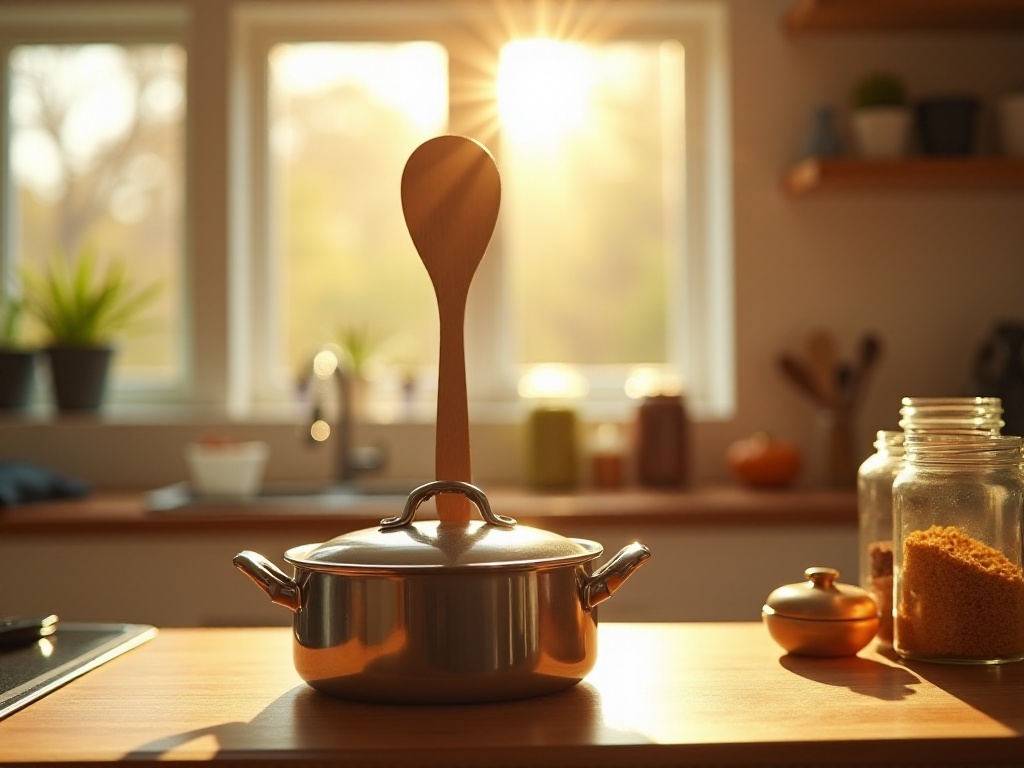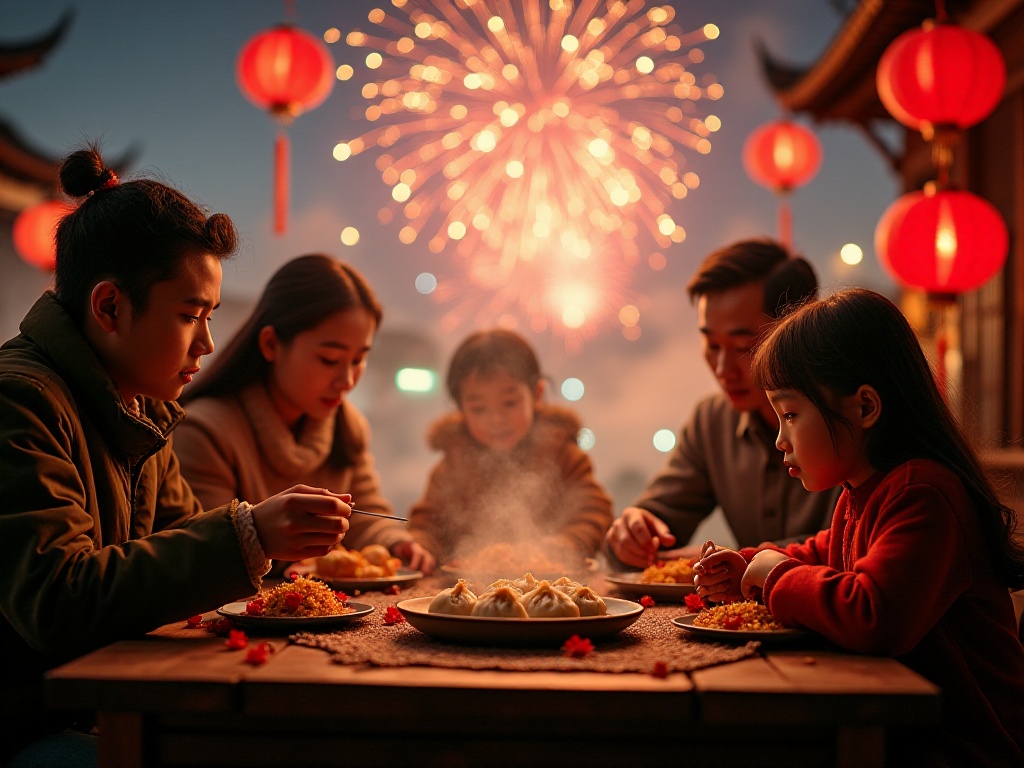Shopping for New Year Goods
The Chinese New Year is approaching, and lately my social media feed has been filled with friends showing off their New Year purchases, making me anxious about what I should prepare. As someone who has been independently shopping for New Year goods for over a decade, I'd like to share my experience. To be honest, I've made quite a few mistakes over the years, but I've learned from them. I believe after reading this article, you can avoid many unnecessary detours.
Around New Year's time, all major supermarkets start buzzing with activity, with "New Year Shopping Festival" banners in bright red everywhere. I must say, retailers nowadays are really good at marketing, with shelves full of dazzling products that make you want to fill up your shopping cart. However, based on years of experience, I can responsibly say that not everything labeled as "New Year goods" is worth buying. According to my experience, New Year goods can be categorized into several main types.
Essential Categories
When it comes to essential items, dried fruits and nuts must be mentioned first. Whether visiting relatives and friends or entertaining guests at home, they are absolutely standard items. However, there's a common pitfall that many people fall into: buying too much at once. I made this mistake last year, impulsively buying several pounds of pistachios, thinking they wouldn't go bad. The result? They weren't finished even by the Qingming Festival, and the remaining ones either weren't fresh or had lost their taste - a complete waste.
After this lesson, I've worked out a more scientific purchasing quantity: calculate based on about 50 grams per family member per day. For example, for a family of four, if you plan to use the New Year goods for half a month, that's: 4 people × 50 grams × 15 days = 3000 grams, or about 3 pounds. This amount is neither too much nor too little, and due to quick turnover, the taste stays optimal.
Besides dried fruits and nuts, candies and chocolates are also essential New Year snacks. Although young people nowadays might not eat much candy, preferring to be health-conscious, remember that elderly relatives and children will visit during the New Year. It would be inappropriate not to have any candy at all. I strongly recommend buying individually wrapped candies for three reasons: first, the portions are just right, preventing overeating; second, they're easy to distribute, especially to children; third, they have a longer shelf life and are less likely to become damp.
Last year, I bought a Dove chocolate New Year's limited edition gift box containing 12 individually wrapped chocolates, each wrapped in festive red foil. Whenever guests came, I would place them on the coffee table - not only did they look good, but everyone said they created a New Year atmosphere. Plus, these gift boxes usually come with a nice gift bag, perfect for an impromptu gift when relatives or friends visit.
Candy varieties have become increasingly diverse nowadays. Besides traditional fruit candies and chocolates, there are many new types like filled candies, gummy candies, and jelly candies. I suggest buying a variety so people of different age groups can find something they like. Last year, I bought an assorted gift box containing hard fruit candies, chocolates, lollipops, and gummy candies, which was very popular - even my cousin who rarely eats candy couldn't resist taking a few extra pieces.
Food Supplies
Honestly, I think the most important part of New Year shopping is stocking up on ingredients needed during the festival. I learned this lesson the hard way last year. I remember on New Year's Eve, I wanted to buy some chives for making dumplings, but after visiting several nearby markets, they were either closed or only had poor quality vegetables left. Since then, I've developed the good habit of stocking up on ingredients in advance.
Speaking of food supplies, frozen foods should be mentioned first. Modern frozen food technology has become quite sophisticated, whether it's dumplings, tangyuan (rice balls), or various semi-prepared dishes, the quality is very good. The biggest advantage is their long shelf life, allowing for advance preparation. However, one important reminder: although frozen foods have long shelf lives, it's recommended to consume them within one month before the expiration date for the best taste.
I usually stock up on frozen dumplings and tangyuan, as these are essential festive foods for the New Year. Additionally, I buy some frozen dim sum like rice cakes and xiaolongbao, which can be heated up for breakfast - very convenient. Last year, I bought a frozen dim sum gift pack from a brand's flagship store, containing various Cantonese dim sum items. When heated up each morning, the elderly in my family said they were even better than those bought outside.
Meat purchases are also important. Based on my experience, it's best to buy meat 3-5 days before Spring Festival - not too early to avoid spoilage, but not too late when good cuts might be unavailable. Many fresh food e-commerce platforms now offer New Year packages, like combinations of pork, beef, and lamb at prices significantly lower than usual. Last year, I bought a New Year package from an e-commerce platform that included 5 pounds of pork (different cuts like belly and tenderloin), 3 pounds of beef (including brisket and sliced beef), and 2 pounds of lamb, all for just 399 yuan, at least 100 yuan cheaper than usual.
Moreover, fresh food delivery is really convenient now - orders arrive the next day, with meat vacuum-packed and lasting at least a week. After receiving the delivery, meat not needed immediately can be frozen, then moved to the refrigerator to thaw a day before use. This ensures freshness and avoids the hassle of carrying lots of meat home from the market.
Vegetable storage also requires strategy. Some hardy vegetables like potatoes, carrots, and white radishes can be bought a few days in advance. However, delicate leafy vegetables are best purchased one or two days before New Year's Eve to ensure freshness. Last year, I tried refrigerating vegetables like chives and lettuce, but found their texture notably inferior to fresh ones.
Seasonings are also easily overlooked. Make sure to have sufficient basic seasonings like soy sauce, vinegar, and cooking wine. Additionally, special seasonings used mainly during New Year, like star anise, cinnamon, and Sichuan peppercorns, should be prepared in advance. I remember last year when making dumplings on New Year's Eve, we suddenly realized we were short on vinegar and had to substitute rice vinegar for aged vinegar - the taste was completely different.

Cleaning Supplies
Regarding cleaning supplies, this might be an important category that many people easily overlook. During Spring Festival, many supermarkets will be closed, and it would be embarrassing if you run out of tissue paper or laundry detergent at this time. So now I always stock up on cleaning supplies in advance.
First are various paper products. Kitchen paper towels and toilet paper are essential, and usage during the New Year period will be much higher than usual. Especially kitchen paper towels, as preparing the New Year's Eve dinner may generate a lot of oil stains, leading to increased usage. Last year, we prepared too little and had to mobilize the whole family to find an open supermarket on the second day of the New Year to restock.
Besides paper products, cleaning agents should also be well-stocked. This includes laundry detergent, dish soap, bathroom cleaner, etc. For quantity, I suggest preparing 30% more than your usual monthly usage. Why 30%? Because there will be more people during the New Year period, and there might be special situations, like needing to clean up spilled red wine immediately, or having to clean an especially dirty range hood unexpectedly.
Garbage bags are also essential. There will be much more garbage during the New Year period than usual, especially after the New Year's Eve dinner. I now prepare garbage bags of different sizes - small ones for snack packaging and other small trash, large ones for kitchen waste. This also makes waste sorting more convenient.
Another often overlooked item is cleaning tools. Items like cleaning cloths, sponges, and dish brushes should all be replaced with new ones. During New Year when entertaining guests, the house needs to be kept clean and tidy, and new cleaning tools work better. Plus, these items aren't expensive - replacing them only costs a few dozen yuan.

Shopping Tips
When it comes to shopping tips, the most important thing is to compare prices across different platforms. Now all major e-commerce platforms launch New Year shopping festivals before Spring Festival with significant discounts, but the price difference for the same product across different platforms can be quite large. Last year, I discovered something amazing - the price difference for the same brand of nut gift box across different platforms could exceed 50 yuan.
So now I always do my homework before shopping for New Year goods. First, I bookmark the items I want to buy on various e-commerce platforms, then wait for promotional activities. From my observations over the years, major platforms usually launch their New Year shopping festivals about 20 days before Spring Festival, when the discounts are the biggest. Some platforms also issue super coupons, which can save quite a bit when used in combination.
Last year, during a platform's New Year shopping festival, I used a new user coupon plus a platform super coupon, and caught an additional category day discount, ultimately spending only 1500+ yuan for New Year goods worth over 2000 yuan. So timing is crucial for saving money.
Another important tip is to pay attention to appropriate quantities when stocking up. I remember my first year in charge of New Year shopping, I had a typical rookie mentality - wanting to buy everything I saw, fearing I wouldn't have enough. As a result, I stockpiled too much, and many items weren't used up even by the Qingming Festival, forcing me to throw them away. Since then, I've developed a rule: buy according to one month's normal consumption plus a 30% buffer - this way you won't stockpile too much or run short.
For example, with toilet paper, my family usually uses 4 packs per month, so preparing 6 packs for the New Year period is about right. For laundry detergent, we usually use one bottle per month, so two bottles are enough. While this precise calculation is a bit troublesome, it prevents waste and saves storage space.
Many e-commerce platforms now have price alert functions. I usually add desired items to my favorites and set price alerts. This way, I receive notifications as soon as items drop to my target price. Last year, I used this method to buy a nut gift box when it hit its lowest price, nearly a hundred yuan cheaper than usual.

Important Notes
When shopping for New Year goods, the most important thing is to check production and expiration dates. Some merchants do clear out near-expiry products during New Year shopping festivals, and it's easy to buy items close to expiration if you're not careful. My advice is to carefully check production dates when buying and try to choose products with recent production dates.
This is especially important for snack items, as they generally have shorter shelf lives. Last year, I saw a friend buy a large box of cookies, only to discover they had just one month left before expiration, forcing everyone to eat them quickly to avoid waste. So now when I buy snacks, I make sure they have at least six months of shelf life remaining.
I now prepare a detailed New Year shopping list that records not only the purchase quantity of each item but also actual consumption patterns. This way, when shopping the following year, I can more accurately gauge purchase quantities. According to my statistics, with proper planning, New Year shopping can save over 30% compared to unplanned purchases.
On this list, I also note the best purchase time for each item. For example, foods with shorter shelf lives are scheduled for purchase one week before Spring Festival, while items with longer shelf lives can be bought two to three weeks in advance. This avoids the pressure of concentrated shopping and ensures each item is consumed at its freshest.
Additionally, when shopping, it's important to check if product packaging is intact. Sometimes products may be damaged during transport, and without careful inspection, you might buy items with damaged packaging. This is especially important for fragile items. Last year, I encountered a situation where a bottle of peanut oil arrived with a cracked cap, fortunately, I discovered it in time and got it replaced.

Storage Management
How to store purchased New Year goods is also a crucial issue. We learned this lesson the hard way - carefully bought nuts lost their crispness because they weren't sealed properly, which was a complete waste. Later, I equipped our home with many sealed containers and food storage boxes specifically for New Year goods, which not only maintains food freshness but also looks neat.
For dry goods, the most important thing is to store them in a cool, dry place, preferably in sealed containers. We now use glass jars with sealing rings, which not only seal well but also allow me to see how much is left at a glance through their transparent design. For snacks, I categorize them in storage boxes, making them easy to find without having to rummage through everything.
Frozen food storage also requires attention to detail. Our refrigerator has different storage zones for different types of food. For example, frozen dumplings and tangyuan are stored in the back of the freezer where the temperature is lowest, most suitable for long-term storage; while frozen foods that need frequent access are placed in more accessible locations.
I store fresh ingredients in categorized food storage containers, each labeled with the contents and purchase date. This not only makes things easy to find but also prevents forgetting about food and letting it spoil. It's especially important to store ingredients that might affect each other's taste separately.
For seasonings, I now use a rotating spice rack with commonly used seasonings placed on it, making them easily accessible while cooking. Less frequently used seasonings are stored in kitchen cabinets and taken out when needed.

Experience Summary
Over the years, from initially being overwhelmed to now being able to calmly prepare for the New Year, my biggest realization is: advance planning is really important. I recommend starting to make lists and plans a month before Spring Festival to avoid last-minute rush.
Advance planning also helps better control the budget. New Year expenses are indeed significant nowadays, so why not save some costs through reasonable planning? According to data from an e-commerce platform, over 60% of consumers start purchasing New Year goods 15 days before Spring Festival, while those who start shopping in the last few days spend an average of 15% more. So, proper timing is indeed key to saving money.
I now keep my New Year shopping list as a phone memo, recording our consumption patterns of New Year goods anytime. This way, by the next year, I clearly know what items we bought too much or too little of, making New Year shopping more precise. This method is particularly suitable for people like me who enjoy data analysis - these data help improve New Year shopping each year.
For example, last year I found our nut consumption was less than expected, so I reduced the purchase quantity this year. Meanwhile, candies were consumed quickly due to many visitors, so I bought more this year. Through such recording and adjustment, now our New Year goods are neither overstocked nor in short supply.
How do you all prepare for New Year shopping? Feel free to share any good suggestions. After all, the New Year is about everyone being happy and festive. I hope everyone can happily prepare their New Year goods and enjoy every Spring Festival.




